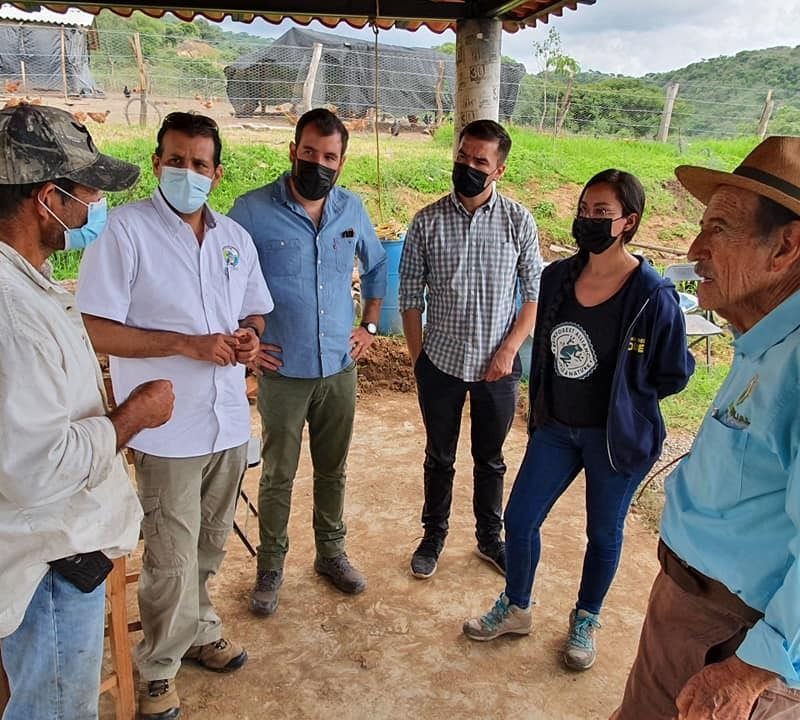In the misty forests of Colombia’s Andes Mountain region, the world seems to be drenched in water. However, as the communities in the Chinchiná River Basin know well, in a changing climate every drop counts. Agricultural expansion, mining practices, livestock grazing, and other factors threaten the clarity and quantity of water available to local communities. Ten years ago, local leaders recognized this threat and formed a governance platform, Pactos por la Cuenca del Río Chinchiná, to coordinate public and private actions across the watershed. By 2018 the Vivo Cuenca Water Fund was born – a sustainable, transparent, and long-term financial mechanism to align the incentives of individual actions with common environmental objectives.
Water Funds are locally owned and driven platforms that bring together private funders, water utilities, hydroelectric companies, and community organizations to make strategic decisions to manage and protect water resources. In early 2000 leaders in Quito, Ecuador, with support from USAID, formed FONAG, the region’s first Water Fund. Since then, communities around the world have replicated FONAG’s successful model – in Colombia, Ecuador and Peru alone more than 22.8 million people depend on the watersheds covered by nine Water Funds.
Forming a Community of Practice
As the ecosystem of Water Funds has grown, groups like Vivo Cuenca are eager to share learning to enable long-term fund sustainability. Enter Fundación Futuro Latinioamericano (FFLA), a regional nonprofit committed to facilitating locally led sustainable development. Recognizing the growing appetite to strengthen Water Fund sustainability, FFLA, with support from the Tinker Foundation, formed the Andean Water Funds Platform. This community of practice will build on existing capacities to support scaling the model to other watersheds across Latin America.
In February 2022, FFLA and nine Water Funds from across Ecuador, Peru, and Colombia met in Manizales, Colombia to design and officially launch the Andean Water Funds Platform. FFLA invited Environmental Incentives to support co-developing solutions to meet common needs across the Water Fund community of practice. The EI team facilitated a participatory workshop to create a common vision and clear path for the Funds, using a logic framework and co-creating a Theory of Change visualized through a Results Chain model.
Sarah Schmidt, Director of EI’s Latin America and Caribbean Portfolio, noted, “Getting the group to come to agreement on the goal of the Platform was especially critical. In using the ‘3 Why’s’ methodology, we pushed the participants to drill deeper to their root motivation for participating in the Platform. Each word of the goal was essential to define and reach consensus on. After a few rounds of iterating as a group, one participant offered a rephrasing which resulted in spontaneous applause from the whole room.”
This facilitation approach builds on EI’s experience with the Conservation Standards, but rather than focusing on conservation results and indicators, we iterated the process to focus on FFLA’s Water Fund Sustainability Tool. Through our experience, the EI/FFLA Team knew it was critical for all nine Water Funds to define their own Results Chain that would support the Platform as a whole. Each Fund had to understand the logic and assumptions to the strategic approach and know how to measure and course correct along the way in order to reach their desired goal of a regionally positioned community of practice to sustain all their individual water funds.
Ripple Effects
As the Water Fund Managers know well, collective action hinges on deliberate, open, and sustained commitment to co-developing solutions that meet the needs of and empower local communities to sustain impact. In just three days the nine Water Funds, with guidance from FFLA and EI, identified a shared vision of the Platform’s future, validated a methodology to measure fund sustainability, and created a guiding framework.
The Andean Water Funds Platform agreed they will focus on:
- Establishing a financial strategy to enhance the sustainability of Water Funds
- Improving communication to better engage additional stakeholders
- Improving internal information channels among Water Funds to foster knowledge management
- Strengthening technical and management capacities of Water Funds to ensure sustainability
The Platform mirrors the model of the Funds themselves, consensus driven, locally created, owned, and led. Together the Water Funds are charting a course to scale impact, advance water protection, and mitigate climate change impacts across the region.
About the Authors
Sarah Schmidt leads Environmental Incentives’ Latin America and Caribbean Portfolio, providing leadership and oversight to USAID programming in the region, ensuring there is cross company collaboration, learning, and adapting to achieve effective results and engaged staff.
Paola Zavala is a Senior Program Cycle Specialist at Environmental Incentives and the Natural Resources Management and Climate Change Program Coordinator for Fundación Futuro Latinoamericano (FFLA).
Lissett Medrano is an Associate at Environmental Incentives with nearly 10 years of experience in international conservation and project management. She provides programmatic and technical assistance to EI’s work in the LAC region, with a with a primary focus on Colombia.



